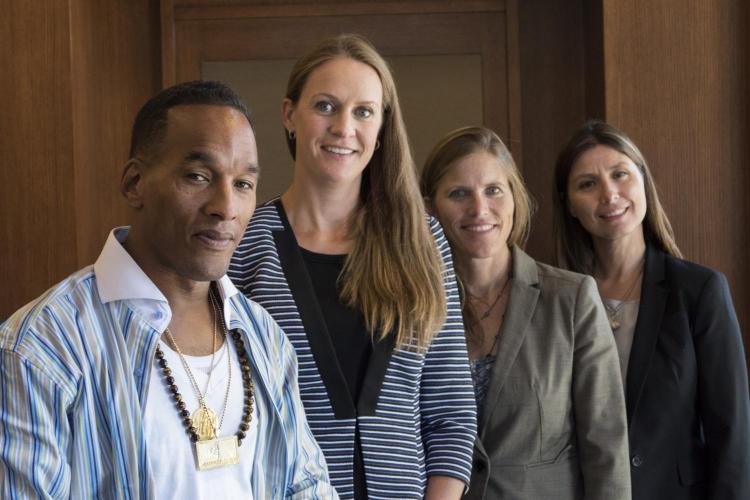About Us

Korey Wise, attorney Jane Fisher-Byrialsen, Clinical Professor Ann England, and Hon. Kristy Martinez at Colorado Law in 2015.
The Korey Wise Innocence Project (KWIP) has been part of the University of Colorado Law School community since 2010. Originally called the Colorado Innocence Project, the organization was founded in 2001 by Jim Scarboro ('70) and a small group of other lawyers, and fell under the Colorado Lawyers Committee. In 2010, the project moved to Colorado Law, where it was coordinated by Clinical Professor Pat Furman ('80) and later Clinical Professor Ann England. Until 2015, the project was fully volunteer-run and had no staff. Without paid staff for its first 15 years, the project was only able to screen cases and then refer promising ones to pro bono lawyers in the community.
In 2014, England wrote a proposal to create a funded innocence organization at Colorado Law. England and then-Dean Phil Weiser, along with members of the Advancement team, began reaching out to individuals and law firms for funding. In 2015, Korey Wise, an exonerated member of the Central Park Five, made a multi-year gift to the organization. The project was renamed in Wise’s honor to recognize his generosity.
KWIP then hired its first program director, Kristy Martinez. During her three years leading the project, Martinez addressed a backlog of thousands of applications from Colorado prisoners claiming innocence. This meant creating a user-friendly database to track the applications through KWIP’s screening process, digitizing and uploading thousands of old records, and guiding a growing number of law student volunteers in the screening of applications. By the time Martinez accepted a judicial appointment at the end of 2018, a strong infrastructure was in place, the backlog of applications was reduced, and several cases were moving steadily towards litigation.
In March 2019, Anne-Marie Moyes joined the project as KWIP’s new director. Since then, KWIP has continued to grow. In September 2020, KWIP hired a staff attorney, Kathleen Lord, and shortly thereafter two postgraduate legal fellows. In 2025, Ann England began her new role as Director and now with a full-time staff of eight, the project is able to investigate more cases and fight to exonerate a growing list of clients.
As part of the law school community, KWIP includes law students in every phase of our work, from screening applications to conducting investigations to challenging wrongful convictions in court. The project has also begun partnering with private attorneys and law firms on individual cases.

